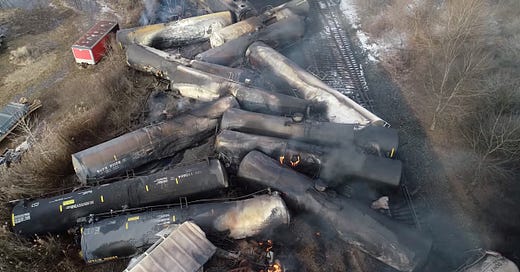Forgotten Americans Suffer Amid Infrastructure Crisis
Dangerous Disconnect Between Political Class and Ordinary Americans
On Friday evening, February 3, 2023, a train derailment unleashed toxic chemicals on the village of East Palestine, Ohio. Explosions and fires ensued. Contamination of air, water, and land was extensive. Mass evacuations followed.
On Tuesday evening, February 7, 2023, official Washington engaged in its ever more self-reverential rituals surrounding the …
Keep reading with a 7-day free trial
Subscribe to The New Nationalist to keep reading this post and get 7 days of free access to the full post archives.





